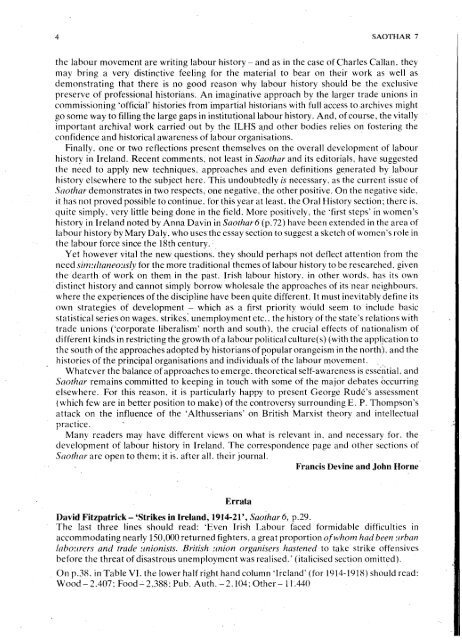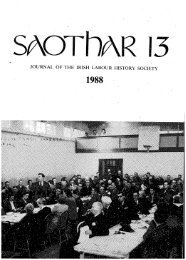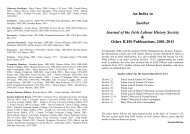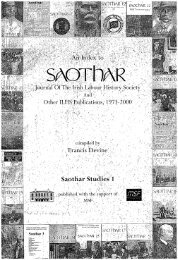Iris an Chumainn le Stair Lucht Saothair na hEireann Journal of the ...
Iris an Chumainn le Stair Lucht Saothair na hEireann Journal of the ...
Iris an Chumainn le Stair Lucht Saothair na hEireann Journal of the ...
You also want an ePaper? Increase the reach of your titles
YUMPU automatically turns print PDFs into web optimized ePapers that Google loves.
4 SAOTHAR 7<br />
<strong>the</strong> labour movement are writing labour history - <strong>an</strong>d as in <strong>the</strong> case <strong>of</strong> Char<strong>le</strong>s Call<strong>an</strong>, <strong>the</strong>y<br />
may bring a very distinctive feeling for <strong>the</strong> material to bear on <strong>the</strong>ir work as well as<br />
demonstrating that <strong>the</strong>re is no good reason why labour history should be <strong>the</strong> exclusive<br />
preserve <strong>of</strong> pr<strong>of</strong>essio<strong>na</strong>l histori<strong>an</strong>s, An imagi<strong>na</strong>tive approach by <strong>the</strong> larger trade unions in<br />
commissioning '<strong>of</strong>ficial' histories from impartial histori<strong>an</strong>s with full access to archives might<br />
go some way to filling <strong>the</strong> large gaps in institutio<strong>na</strong>l labour history, And, <strong>of</strong> course, <strong>the</strong> vitally<br />
import<strong>an</strong>t archival work carried out by <strong>the</strong> ILHS a,nd o<strong>the</strong>r bodies relies on fostering <strong>the</strong><br />
confidence <strong>an</strong>d historical awareness <strong>of</strong> labour org<strong>an</strong>isations.<br />
Fi<strong>na</strong>lly. one or two ref<strong>le</strong>ctions present <strong>the</strong>mselves on <strong>the</strong> overall development <strong>of</strong> labour<br />
history in Irel<strong>an</strong>d. Recent comments: not <strong>le</strong>ast in Saothar <strong>an</strong>d its editorials, have suggested<br />
<strong>the</strong> need to apply new techniques, approaches <strong>an</strong>d even definitions ge.nerated by labour<br />
history elsewhere to <strong>the</strong> subject here. This undoubtedly is necessary. as <strong>the</strong> current issue <strong>of</strong><br />
Saothar demonstrates in two respects, one negative, <strong>the</strong> o<strong>the</strong>r positive. On <strong>the</strong> negative side.<br />
it has not proved possib<strong>le</strong> to continue. for this year at <strong>le</strong>ast. <strong>the</strong> Oral History section; <strong>the</strong>re is.<br />
quite simply. very litt<strong>le</strong> being done in <strong>the</strong> field. More positively, <strong>the</strong> 'first steps' in women's<br />
history in Irel<strong>an</strong>d noted by An<strong>na</strong> Davin in Saothar 6 (p.72) have been extended in <strong>the</strong> area <strong>of</strong><br />
lahour history by Mary Daly. who uses<strong>the</strong> essay section to suggest a sketch <strong>of</strong> women's ro<strong>le</strong> in<br />
<strong>the</strong> labour force since <strong>the</strong> 18th century.<br />
Yet however vital <strong>the</strong> new questions. <strong>the</strong>y should perhaps not def<strong>le</strong>ct attention from <strong>the</strong><br />
need sim:tlt<strong>an</strong>eo:tsly for <strong>the</strong> more traditio<strong>na</strong>l <strong>the</strong>mes <strong>of</strong> labour history to be researched, given<br />
<strong>the</strong> dearth <strong>of</strong> work on <strong>the</strong>m in <strong>the</strong> past. <strong>Iris</strong>h labour history. in o<strong>the</strong>r words. has its own<br />
distinct history <strong>an</strong>d c<strong>an</strong>not simply borrow who<strong>le</strong>sa<strong>le</strong> <strong>the</strong> approaches <strong>of</strong> its near neighbours.<br />
where <strong>the</strong> experiences <strong>of</strong> <strong>the</strong> discipline have been quite different. It must inevitably define its<br />
own strategies <strong>of</strong> development - which as a first priority would seem to include basic<br />
statistical series on wages. strikes: unemployment etc .. <strong>the</strong> history <strong>of</strong> <strong>the</strong> state's relations with<br />
trade unions ('corporate liberalism' north <strong>an</strong>d south). <strong>the</strong> crucial effects <strong>of</strong> <strong>na</strong>tio<strong>na</strong>lism <strong>of</strong><br />
different kinds in restricting <strong>the</strong> growth <strong>of</strong> a labour political culture(s) (with <strong>the</strong> application to<br />
<strong>the</strong> south <strong>of</strong> <strong>the</strong> approaches adopted by histori<strong>an</strong>s <strong>of</strong> popular or<strong>an</strong>ge ism in <strong>the</strong> north). <strong>an</strong>d <strong>the</strong><br />
histories <strong>of</strong> <strong>the</strong> principal org<strong>an</strong>isations <strong>an</strong>d individuals <strong>of</strong> <strong>the</strong> labour movement. "<br />
Whatever <strong>the</strong> bal<strong>an</strong>ce <strong>of</strong> approaches to emerge, <strong>the</strong>oretical self-awareness is esseritial. <strong>an</strong>d<br />
Saothar remains committed to keeping in touch with some <strong>of</strong> <strong>the</strong> major debates occurring<br />
elsewhere. For this reason, it is particularly happy to present George Rude's assessment<br />
(which few are in better position to make) <strong>of</strong> <strong>the</strong> controversy surrounding E. P. Thompson's<br />
attack on <strong>the</strong> influence <strong>of</strong> <strong>the</strong> 'Althusseri<strong>an</strong>s' on British Marxist <strong>the</strong>ory <strong>an</strong>d intel<strong>le</strong>ctual<br />
practice.<br />
M<strong>an</strong>y readers may have different views on what is re<strong>le</strong>v<strong>an</strong>t in. <strong>an</strong>d necessary for. <strong>the</strong><br />
development <strong>of</strong> labour history in Irel<strong>an</strong>d. The correspondence page <strong>an</strong>d o<strong>the</strong>r sections <strong>of</strong><br />
Saothar are open to <strong>the</strong>m; it is. after all. <strong>the</strong>ir jour<strong>na</strong>l.<br />
Fr<strong>an</strong>cis Devine <strong>an</strong>d John Home<br />
Errata<br />
David Fitzpatrick - 'Strikes in Irel<strong>an</strong>d, 1914-21', Saothar 6, p.29.<br />
The last three lines should read: 'Even <strong>Iris</strong>h Labour faced formidab<strong>le</strong> difficulties in<br />
accommodating nearly 150,000 returned fighters, a great proportion <strong>of</strong> whom had been :trb<strong>an</strong><br />
labo:trers <strong>an</strong>d trade :tnionists. British :tnion org<strong>an</strong>isers hastened to take strike <strong>of</strong>fensives<br />
before <strong>the</strong> threat <strong>of</strong> disastrous unemployment was realised.' (italicised section omitted).<br />
On p.38. in Tab<strong>le</strong> VI. <strong>the</strong> lower halfright h<strong>an</strong>d column 'Irel<strong>an</strong>d' (for 1914-1918) should read:<br />
Wood - 2.407; Food- 2.388: Pub. Auth. -2.104; O<strong>the</strong>r - 11.440





